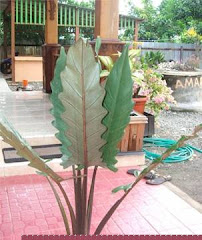Multa Fidrus , The Jakarta Post , Tangerang | Thu, 08/07/2008 10:09 AM | City
Fed up with racketeers, public minivan transportation drivers along the Cileduk-Pondok Kacang route commenced striking Tuesday.
The drivers said they would continue the strike until the Tangerang municipal transportation agency and the police undertook stern measures to stop the extortionists, who daily threaten drivers with violence.
Illegal fees had become exorbitant, ranging from Rp 5,000 to Rp 25,000 a day, the drivers said, adding the racketeers do not hesitate to resort to violence when refused.
"We can no longer stand being extorted each day like milked cows. We have to endure violence at the hands of these hoodlums," Rojali, 35, one of the striking drivers, told The Jakarta Post at the Cileduk intersection Wednesday.
In protest, drivers parked their minivans at various intersections, leaving hundreds of passengers along the route stranded each day since Tuesday.
Cileduk chief detective First Insp. Erizal said the police had arrested one suspected member of the racket identified as Sodik, alias Bontai, following a police report filed by the drivers.
Officers picked up Bontai at his home in Pondok Serut village in the Pondok Aren district Tuesday and were still looking for his accomplices, Erizal added.
The police will charge the suspect with violating article 368 of the criminal code, on violence. The article carries a maximum penalty of five years in prison.
The Association of Public Transportation Drivers (SPAU) urged local transportation agencies to improve their systems for issuing public transportation minivan permits so that such minivans can operate and properly serve recommended routes.
"The transportation agency and the police must coordinate their efforts to stop hoodlums from demanding money from drivers along their routes," SPAU chairman Saiful Milah said.
Based on the SPAU's calculations, drivers and transportation companies had to spend up to Rp 18 billion on racketeering fees, he added.
In Tangerang regency, the head of the regency transportation agency Deden Sugandhi said illegal fees were collected on many of the regency's streets, involving unauthorized officers who used agency uniforms.
"Racketeering on the part of these unauthorized officers has really embarrassed the regency administration, especially the transportation agency," Deden said, adding he had frequently received reports from community members about such fees.
The impostors collected between Rp 2,000 and Rp 5,000 from each passing driver, particularly after midnight at several spots in the Pamulang and Cisauk districts.
In response to complaints, Deden conducted an undercover investigation, disguised as a pickup truck driver.
In total, he arrested six men stationed at separate spots posing as officers and demanding a Rp 5,000 fee, he said.
The drivers said they would continue the strike until the Tangerang municipal transportation agency and the police undertook stern measures to stop the extortionists, who daily threaten drivers with violence.
Illegal fees had become exorbitant, ranging from Rp 5,000 to Rp 25,000 a day, the drivers said, adding the racketeers do not hesitate to resort to violence when refused.
"We can no longer stand being extorted each day like milked cows. We have to endure violence at the hands of these hoodlums," Rojali, 35, one of the striking drivers, told The Jakarta Post at the Cileduk intersection Wednesday.
In protest, drivers parked their minivans at various intersections, leaving hundreds of passengers along the route stranded each day since Tuesday.
Cileduk chief detective First Insp. Erizal said the police had arrested one suspected member of the racket identified as Sodik, alias Bontai, following a police report filed by the drivers.
Officers picked up Bontai at his home in Pondok Serut village in the Pondok Aren district Tuesday and were still looking for his accomplices, Erizal added.
The police will charge the suspect with violating article 368 of the criminal code, on violence. The article carries a maximum penalty of five years in prison.
The Association of Public Transportation Drivers (SPAU) urged local transportation agencies to improve their systems for issuing public transportation minivan permits so that such minivans can operate and properly serve recommended routes.
"The transportation agency and the police must coordinate their efforts to stop hoodlums from demanding money from drivers along their routes," SPAU chairman Saiful Milah said.
Based on the SPAU's calculations, drivers and transportation companies had to spend up to Rp 18 billion on racketeering fees, he added.
In Tangerang regency, the head of the regency transportation agency Deden Sugandhi said illegal fees were collected on many of the regency's streets, involving unauthorized officers who used agency uniforms.
"Racketeering on the part of these unauthorized officers has really embarrassed the regency administration, especially the transportation agency," Deden said, adding he had frequently received reports from community members about such fees.
The impostors collected between Rp 2,000 and Rp 5,000 from each passing driver, particularly after midnight at several spots in the Pamulang and Cisauk districts.
In response to complaints, Deden conducted an undercover investigation, disguised as a pickup truck driver.
In total, he arrested six men stationed at separate spots posing as officers and demanding a Rp 5,000 fee, he said.


